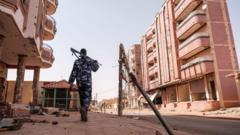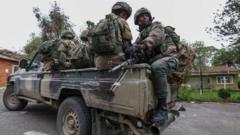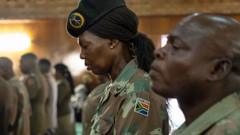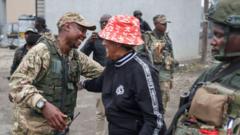The US has formally accused the Rapid Support Forces of committing genocide against the Sudanese people, resulting in sanctions against its leader, Hemedti, in light of escalating violence and humanitarian crises.
US Accuses Sudan's RSF of Genocide Amid Sanctions on Leader Hemedti
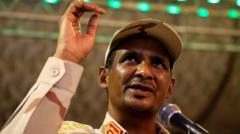
US Accuses Sudan's RSF of Genocide Amid Sanctions on Leader Hemedti
Allegations of systemic atrocities lead to severe penalties for RSF commander Mohamed Hamdan Dagalo.
The United States government has leveled serious accusations against the Sudanese paramilitary group known as the Rapid Support Forces (RSF), claiming they have engaged in genocide during the ongoing conflict that began 20 months ago. US Secretary of State Antony Blinken announced sanctions on RSF's commander, Mohamed Hamdan Dagalo, commonly referred to as Hemedti, stating that he is being held accountable for "systematic" atrocities committed against civilians, particularly targeting men, boys, and even infants along with brutal sexual violence inflicted on women.
In his remarks, Blinken stated, "Based on this information, I have now concluded that members of the RSF and allied militias have committed genocide in Sudan." This accusation follows an alarming trend of violence where RSF-aligned groups have allegedly been responsible for the murders of fleeing civilians amidst the ongoing skirmish with the Sudanese military, which has been raging since April 2023. Humanitarian concerns have surged, with experts estimating that as many as 150,000 individuals may have lost their lives in this violent confrontation.
The RSF responded to these allegations by accusing the United States of employing double standards, claiming that such statements reflect an inadequacy in addressing the complexities of the Sudanese crisis. El-Basha Tbaeq, an advisor to Hemedti, expressed concerns that these sanctions could further exacerbate the situation and hinder ongoing negotiations.
Over the course of the conflict, both the RSF and the Sudanese military have faced accusations of committing war crimes and atrocities. Currently, the situation is catastrophic, with famine being declared in multiple regions, and approximately 24.6 million people—half the country's population—requiring immediate food assistance.
Blinken also remarked that neither the RSF nor the military are legitimate governing bodies for Sudan's future, underscoring the absence of accountability by both factions amid the humanitarian disaster. The recent sanctions ban Hemedti and his family from entering the US and freeze any assets he holds there. In a wider scope, this action also targets seven RSF-operated companies in the UAE, adding further complexity to the balance of power and influence within Sudan.
Critics of the US government suggest that Washington has not implemented enough strategies to cease hostilities in Sudan, even as discussions continue through the Jeddah talks and other international forums. This recent designation marks a critical step taken by the Biden administration and may receive the backing of Congress, offering a coherent position that delineates the US’s stance on the RSF more clearly as the conflict evolves.
The impact of these sanctions on the ground remains uncertain, but they are poised to apply pressure on the RSF’s regional backers and may potentially shift relationships toward establishing a viable governance framework in territories controlled by Hemedti's forces. How this will affect future ceasefire negotiations, however, is yet to be seen, as the Sudanese army has mentioned the possibility of Turkish mediation alongside the UAE’s involvement.
In his remarks, Blinken stated, "Based on this information, I have now concluded that members of the RSF and allied militias have committed genocide in Sudan." This accusation follows an alarming trend of violence where RSF-aligned groups have allegedly been responsible for the murders of fleeing civilians amidst the ongoing skirmish with the Sudanese military, which has been raging since April 2023. Humanitarian concerns have surged, with experts estimating that as many as 150,000 individuals may have lost their lives in this violent confrontation.
The RSF responded to these allegations by accusing the United States of employing double standards, claiming that such statements reflect an inadequacy in addressing the complexities of the Sudanese crisis. El-Basha Tbaeq, an advisor to Hemedti, expressed concerns that these sanctions could further exacerbate the situation and hinder ongoing negotiations.
Over the course of the conflict, both the RSF and the Sudanese military have faced accusations of committing war crimes and atrocities. Currently, the situation is catastrophic, with famine being declared in multiple regions, and approximately 24.6 million people—half the country's population—requiring immediate food assistance.
Blinken also remarked that neither the RSF nor the military are legitimate governing bodies for Sudan's future, underscoring the absence of accountability by both factions amid the humanitarian disaster. The recent sanctions ban Hemedti and his family from entering the US and freeze any assets he holds there. In a wider scope, this action also targets seven RSF-operated companies in the UAE, adding further complexity to the balance of power and influence within Sudan.
Critics of the US government suggest that Washington has not implemented enough strategies to cease hostilities in Sudan, even as discussions continue through the Jeddah talks and other international forums. This recent designation marks a critical step taken by the Biden administration and may receive the backing of Congress, offering a coherent position that delineates the US’s stance on the RSF more clearly as the conflict evolves.
The impact of these sanctions on the ground remains uncertain, but they are poised to apply pressure on the RSF’s regional backers and may potentially shift relationships toward establishing a viable governance framework in territories controlled by Hemedti's forces. How this will affect future ceasefire negotiations, however, is yet to be seen, as the Sudanese army has mentioned the possibility of Turkish mediation alongside the UAE’s involvement.

